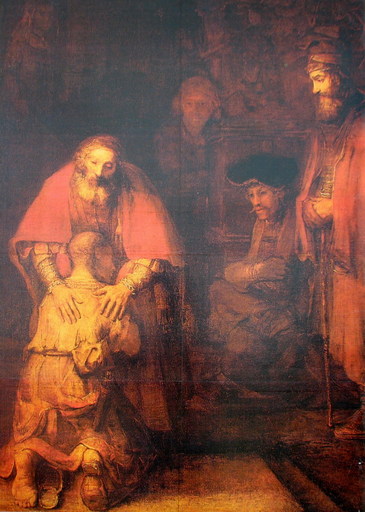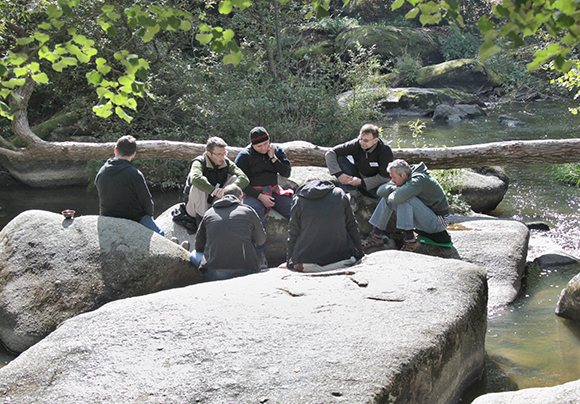
Starý muž, který se neumí smát, je trouba.
Richard Rohr
Kdo jsme?
Tento web reprezentuje hnutí Chlapi, neformální společenství mužů, kteří hledají takové způsoby duchovního prožívání, se kterými se dokážou jako muži ztotožnit a celou bytostí je žít.
Můžeš se tady setkat s muži, kteří usilují o to být lepšími a více autentickými.
Vytváříme jak reálný tak virtuální prostor pro setkávání.
Začalo to někdy před rokem 2000 hledáním mužské energie, spirituality i chlapské party a setkáváním v malých skupinách. Pokračovalo to inspirací dílem Richarda Rohra a jeho Rituálem pro přechod do zralé dospělosti a pokračuje to dodnes stovkami setkání v malých skupinách, víkendovými akcemi pro muže i pro otce a děti, rituály i celostátními setkáními pro stovky účastníků a mezinárodní spoluprací s hnutím mužů po celém světě.
Pro řadu z nás je podstatné přátelství s Bohem, pro všechny jsou oporou kamarádi, které tu nalezli.
Vítáme tě mezi námi a těšíme se na společné putování.

Pavel Hrdina a Martin Šmídek
Překlad meditace CAC z pátku 21. 7. 2023
na téma:
Předpojatost zdola
| Bůh je na straně bolesti Teolog Kwok Pui Lan zakouší v Ježíšově bolestné smrti Boží solidaritu s utrpením asijských žen. Ježíš volal po Jeruzalému. Jeho zármutek byl tak hluboký, že Matouš musel použít "ženskou metaforu", aby popsal, co skutečně cítil: "Kolikrát bych chtěl shromáždit tvé děti, jako slepice shromažďuje své potomstvo pod svá křídla…" (Mt 23,37). Oč více by matka naříkala nad svým mrtvým synem, který zahynul ve válkách v Indočíně? Jak mohou matky, manželky a milenky v Koreji, které jsou odloučeny od svých milovaných, přestat plakat nad rozdělenou zemí?... [Asijské] ženy trpí tisíciletými předsudky a diskriminací východních kultur, v nichž dominují muži, bezuzdným společensko-politickým vykořisťováním a svou strukturální zranitelností. Tato velká břemena se spojují, aby ženu připravila o její osobnost a učinila z ní nikoho. Protože se utrpení dotýká nejhlubšího nitra její bytosti, cítí bolest trpícího Boha: Boha, který volal z kříže... Boha, který byl usmrcen vojenskými a politickými silami, který byl svlečen do naha, urážen a popliván. Neřekl snad prorok Izaiáš: "Byl v opovržení a zavržen lidmi, muž bolestí a známý zármutkem, jako ten, před nímž lidé skrývají tvář…" (Iz 53,3)? Bůh na sebe vzal riziko stát se člověkem a osobně zakouší, co to znamená být nikým. Je to právě osoba na kříži, která trpí jako my, stala se ne-tělem, která osvětluje naši tragickou lidskou existenci a promlouvá k bezpočtu žen v Asii. Nehledíme na Ježíše jako na pouhý příklad k následování, ani se ho nebudeme snažit zbožštit. Vidíme Ježíše jako Boha, který na sebe bere lidskou podobu, trpí a pláče s námi. [1] Pro Richarda Rohra je "zaujatost zdola" způsobem následování Boha a prožívání života ze strany utrpení: Místo toho, aby legitimizovala to, co už děláme, se teologie osvobození jednoduše snaží číst text ze strany bolesti. To je vše. Pro mě je to Ježíšova ikona - nečíst ze strany moci, ale ze strany bolesti. Kdo má bolest? Kde je bolest? Jak mnozí říkají, Ježíš je na obou stranách každé války. Němci v první světové válce měli na přezkách opasků své "Gott mit uns" [Bůh s námi], ale Bůh je v zákopech na obou stranách. Bůh je se všemi lidmi, kteří volají ve své bolesti. Nenechává nás to v pocitu bezmoci? Už to není výlučný Bůh naší skupiny, je to univerzální Bůh celé země, všech národů. Ale takto je možné uvažovat pouze tehdy, když se posuneme na úroveň moudrosti, která je úrovní osvobození. Na skupinově zaměřené náboženství už nemáme čas. Je tu příliš mnoho utrpení. [2] Fr. Richard Rohr, OFM přeloženo DeepL | God Is on the Side of Pain
In Jesus’ painful death, theologian Kwok Pui Lan experiences God’s solidarity with the suffering of Asian women. Jesus cried out for Jerusalem. His sorrow was so deep that Matthew had to use a “feminine metaphor” to describe what he actually felt: “How often would I have gathered your children together as a hen gathers her brood under her wings…” (Matthew 23:37). How much more would a mother lament over her dead son who died in the wars in Indochina? How can the mothers, wives, and lovers in Korea who are separated from their loved ones stop crying over the divided country?… [Asian] women suffer from the millennia-old prejudices and discriminations of the male-dominated Eastern cultures, from rampant socio-political exploitations, and from their structural vulnerability. These big burdens join hand-in-hand to rob a woman of her personhood, to render her a no-body. Because suffering touches the innermost part of her being, she feels the pain of the suffering God: a God who cried out from the cross … a God who was put to death by the military and political forces, who was stripped naked, insulted and spat upon. Didn’t the prophet Isaiah say: “He was despised and rejected by men, a man of sorrows and acquainted with grief, and as one from whom men hide their faces…” (Isaiah 53:3)? God has taken the risk to become a human being, and experiences personally what it means to be a no-body. It is the very person on the cross that suffers like us, was rendered a no-body, who illuminates our tragic human existence and speaks to countless women in Asia. We are not looking to Jesus as a mere example to follow, neither shall we try to idolize him. We see Jesus as the God who takes human form and suffers and weeps with us. [1] For Richard Rohr, the “bias from the bottom” is a way of following God and living life from the side of suffering: Instead of legitimating what we are already doing, liberation theology simply tries to read the text from the side of the pain. That’s all. For me, that is the icon of Jesus—to read not from the side of power, but from the side of pain. Who has the pain? Where is the pain? As many have said, Jesus is on both sides of every war. The Germans in the First World War had their “Gott mit uns” [God with us] on their belt buckles, but God is in the foxholes of both sides. God is with all people crying out in their pain. Doesn’t that leave us feeling helpless? It’s not an exclusive god of our group anymore; it’s the universal God of all the earth, of all peoples. But it’s only possible to think this way when we move to the level of wisdom, which is the level of liberation. We don’t have time for group-centric religion anymore. There is too much suffering. [2] Fr. Richard Rohr, OFM |
[1] Kwok Pui Lan, “God Weeps with Our Pain,” in New Eyes for Reading: Biblical and Theological Reflections by Women from the Third World, ed. John S. Pobee and Barbel von Wartenberg-Potter (Bloomington, IN: Meyer Stone Books, 1987), 92.
[2] Adapted from Richard Rohr, “Gospel Call for Compassionate Action (Bias from the Bottom),” CAC Foundation Set (Albuquerque, NM: Center for Action and Contemplation, 2007). Available as MP3 download.
Zde se nacházejí překlady Daily Meditations, jejichž anglické originály se nacházejí na webu CAC. V den jejich vydání je zde nalezneš přeložené strojově pomocí DeepL, zpravidla do druhého dne pak projdou jazykovou úpravou někým z týmu překladatelů :-) Pokud vládneš dobrou angličtinou, přihlas se asi raději přímo u zdroje těchto úvah, tedy na webu CAC. Budeš je pak do své mailové schránky dostávat již k ranní kávě. -mš-
 Myšlenka Richarda Rohra na pondělí po první neděli postní - Není žádná země zaslíbená Mojžíšův příběh obsahuje jednu ironii dějin: Mojžíš se do země Izraele nedostal. Viděl ji zdálky, když se díval přes řeku Jordán. Zdálo se, že zemřel dřív, než ji překročil, a tak bibličtí spisovatelé pro to později hledali nějaký teologický význam. Říká se, že na poušti selhal ve víře, takže ho Bůh potrestal. Není …
Myšlenka Richarda Rohra na pondělí po první neděli postní - Není žádná země zaslíbená Mojžíšův příběh obsahuje jednu ironii dějin: Mojžíš se do země Izraele nedostal. Viděl ji zdálky, když se díval přes řeku Jordán. Zdálo se, že zemřel dřív, než ji překročil, a tak bibličtí spisovatelé pro to později hledali nějaký teologický význam. Říká se, že na poušti selhal ve víře, takže ho Bůh potrestal. Není …




